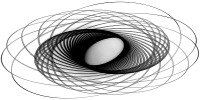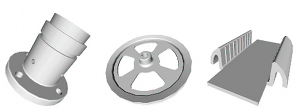F. C. Langbein, B. I. Mills, A. D. Marshall, R. R. Martin. Finding Approximate Shape Regularities in Reverse Engineered Solid Models Bounded by Simple Surfaces. In: D. C. Anderson, K. Lee (eds), Proc. ACM Symp. Solid Modelling and Applications, pp. 206-216, 2001. [DOI:10.1145/376957.376981] [PDF]
Current reverse engineering systems are able to generate simple valid boundary representation (B-rep) models from 3D range data. Such models suffer from various inaccuracies caused by noise in the input data and algorithms. The quality of reverse engineered geometric models can potentially be improved by finding candidate shape regularities in such an initial model, and imposing a suitable subset of them on the model by using constraints, in a postprocessing step called beautification. Finding such candidate regularities is a necessary first step, and is discussed in this paper. Algorithms for analysis are presented which use feature objects to describe properties of faces, edges and vertices, and small groups of these elements in a B-rep model with only planar, spherical, cylindrical, conical and toroidal faces. The methods seek similarities between feature objects, e.g. axes which are parallel, for each property type. For each group of similar feature objects they also try to find a special feature object which might represent the group, e.g. an integer value which approximates the radius of similar cylinders. The feature objects used represent shape parameters, directions, axes and positions present in the model. Experiments show that the regularities found by these algorithms include the desired regularities. Although other spurious regularities which must be discarded in subsequent beautification steps are also produced, their number can be reduced by appropriate choice of tolerance values.
![]() This work is licensed under a Creative Commons Attribution-NonCommercial-ShareAlike 4.0 International License.
This work is licensed under a Creative Commons Attribution-NonCommercial-ShareAlike 4.0 International License.

